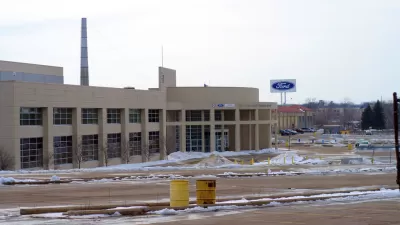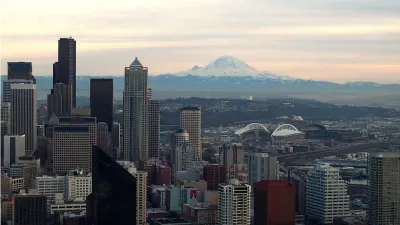A master plan for the redevelopment of Ford's former Twin Cities Assembly Plant, set on 122 acres along the Mississippi River in St. Paul, is challenged by controversy.
"The St. Paul City Council decided Wednesday to limit the maximum height of some buildings that could be erected on the Ford site, but the move failed to satisfy residents worried by the prospect of 7,000 people being added to a compact neighborhood," reports James Walsh.
"The changes, proposed by Council Member Chris Tolbert, scale down the heights of the tallest buildings that can go on the site from 110 feet to 75 feet — from 10 stories to six — unless the developer agrees to set aside even more green space in exchange," adds Walsh.
Opponents to the project, however, say Tolbert's plan doesn't achieve their goals of reducing the project's density.
Ford is expected to sell the property by the end of the year or early next year. Meanwhile the current master plan process moves forward, with a public hearing for the Ford Site Zoning and Public Realm Master Plan [pdf] scheduled for September 20.
FULL STORY: St. Paul shrinks building heights in proposed Ford site development plan

Alabama: Trump Terminates Settlements for Black Communities Harmed By Raw Sewage
Trump deemed the landmark civil rights agreement “illegal DEI and environmental justice policy.”

Study: Maui’s Plan to Convert Vacation Rentals to Long-Term Housing Could Cause Nearly $1 Billion Economic Loss
The plan would reduce visitor accommodation by 25% resulting in 1,900 jobs lost.

Why Should We Subsidize Public Transportation?
Many public transit agencies face financial stress due to rising costs, declining fare revenue, and declining subsidies. Transit advocates must provide a strong business case for increasing public transit funding.

Wind Energy on the Rise Despite Federal Policy Reversal
The Trump administration is revoking federal support for renewable energy, but demand for new projects continues unabated.

Passengers Flock to Caltrain After Electrification
The new electric trains are running faster and more reliably, leading to strong ridership growth on the Bay Area rail system.

Texas Churches Rally Behind ‘Yes in God’s Back Yard’ Legislation
Religious leaders want the state to reduce zoning regulations to streamline leasing church-owned land to housing developers.
Urban Design for Planners 1: Software Tools
This six-course series explores essential urban design concepts using open source software and equips planners with the tools they need to participate fully in the urban design process.
Planning for Universal Design
Learn the tools for implementing Universal Design in planning regulations.
Caltrans
Smith Gee Studio
Institute for Housing and Urban Development Studies (IHS)
City of Grandview
Harvard GSD Executive Education
Toledo-Lucas County Plan Commissions
Salt Lake City
NYU Wagner Graduate School of Public Service




























